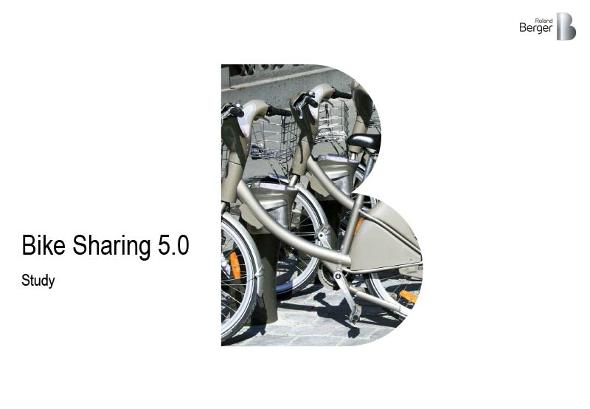Bike Sharing: Cornerstone of future urban mobility
![{[downloads[language].preview]}](https://www.rolandberger.com/publications/publication_image/Roland_Berger_Bike_sharing_study_Cover_download_preview.jpg)
The global use of innovative mobility concepts like bike sharing booms. Our study reveals the worldwide sales of bike sharing services will increase to about 7 to 8 billion euros by 2021.



Pedal power is becoming the transport mode of choice for urban dwellers around the globe. Bicycles offer a means of travel that allows people to get to their destination quickly and cheaply, especially in large cities with congested roads. With worldwide sales of bike sharing services forecast to increase to EUR 8 billion by 2021, a veritable race for global supremacy has already begun.

"Bike sharing is cheap, convenient and ideal for urban distances – it is no wonder that it is booming in congested Asia."
Rapid growth, especially in Asia, is fueled by the continued strong demand for cost-effective mobility , largely unregulated market access and massive investment. Private providers have recently mobilized more than USD 3 billion in venture capital to expand not just in China, but globally. Asian market leaders ofo and Mobike (each with 200 million registered users), which, unlike European providers, operate free-floating instead of station-based systems, have been pushing the European market since 2017.
The study shows that the bike-sharing market is benefiting from rising global environmental awareness and the common sharing trend, as people are more willing to pay for mobility than for owning a car or a bicycle. In addition, cycling is cheaper than a taxi, ride-hailing or an own car, and more flexible than public transport systems. Because the use of a rental bike can also be easily combined with other means of transport, bike sharing will become an important pillar in a growing urban ecosystem of sharing (car, bicycle, ride-sharing) and mobility services (platforms, apps, aggregators).
Despite the promising opportunities offered by the burgeoning bike-sharing market, the rapid pace of growth is not without its pitfalls. Operators are faced with becoming the target of vandalism, or oversupply in certain cities. We predict the market will consolidate in the coming years, with a smaller number of high quality offerings surviving the initial boom to find longer term success.
Bike sharing systems need to be simple, multimodally integrated and low-priced, offering high-quality bikes in a dense network. A user-friendly, app-based rental process and no advance registration increase usability and reduce entry barriers for new users. Furthermore, integrated infrastructure including information and payment for other mobility services are among the key success factors.

![{[downloads[language].preview]}](https://www.rolandberger.com/publications/publication_image/Roland_Berger_Bike_sharing_study_Cover_download_preview.jpg)
The global use of innovative mobility concepts like bike sharing booms. Our study reveals the worldwide sales of bike sharing services will increase to about 7 to 8 billion euros by 2021.